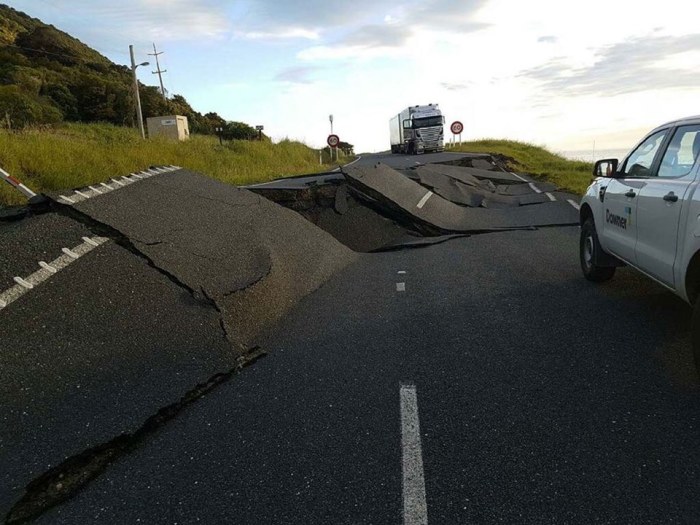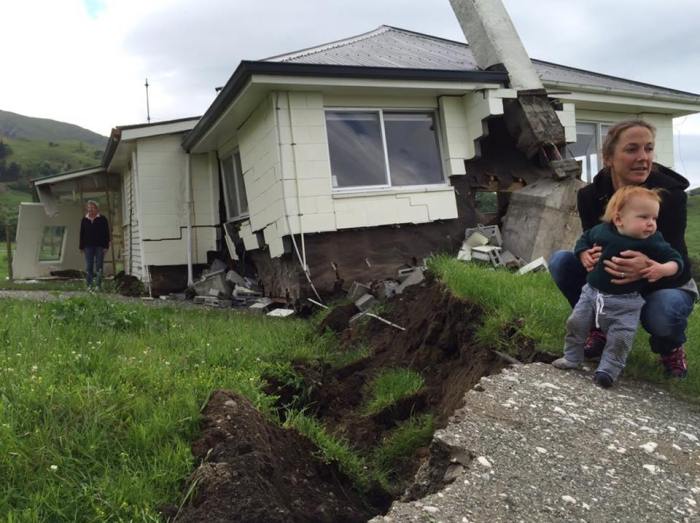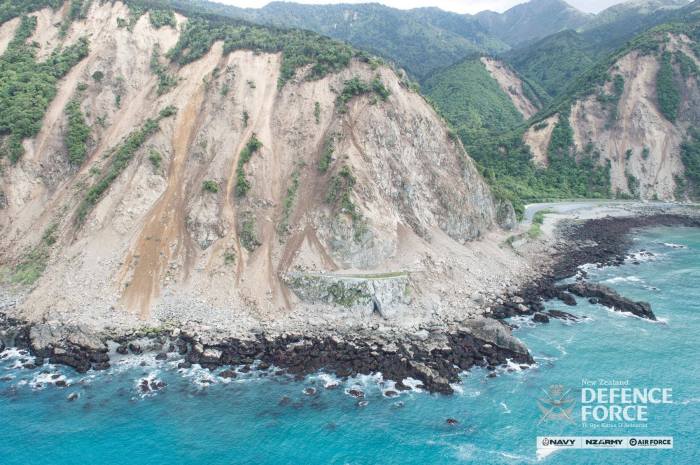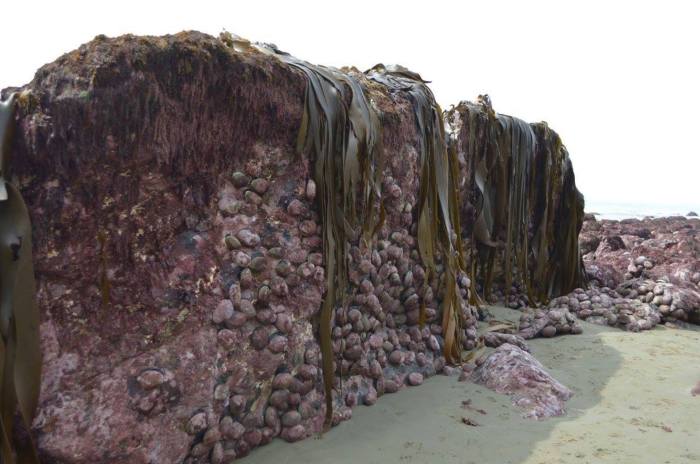I have been feeling quite numb all week. Not really sure how to process what has happened. Writing seems to help, so here goes. Brain dump…
In the early hours of Monday morning 14 November 2016, much of New Zealand was shaken awake by a prolonged and violent earthquake, absolutely devastating a large portion of the north east coast of the South Island (just north of us) and damaging buildings in our capital city, Wellington.
As I lay in my bed, feeling the earth ripple beneath me for what felt like about two minutes, I could tell it was a very big earthquake a long way away. 7.8 magnitude to be precise, centred about 100km north of our city. You see us Cantabrians consider ourselves earthquake connoisseurs. In 2010 the city of Christchurch in the South Island was ripped apart by a series of strong earthquakes, followed by over 15,000 aftershocks (maybe more – I’ve lost count…) over the last six years.
We all quickly became experts in liquefaction, magnitudes, and which fault was ‘going off’ by how each earthquake felt. A quick office sweepstake would run on the size, depth and location of the quake. Our predictions were quickly confirmed by the Geonet website.
If being shaken awake wasn’t bad enough, the next concern was the risk of a tsunami. Tsunami warning sirens sounded on beach suburbs up the entire East Coast of the South Island, and South coast of the North Island, sending beach side residents fleeing for higher ground, and me fearing about the fate of my yacht on her mooring in the harbour. (She is fine) and for my son Seth who was on his fathers launch in the Marlborough Sounds. (They were fine too)
It is fair to say that not many people in New Zealand slept particularly well for the rest of the night, particularly those living near the sea or in the severely damaged areas just north of here. Kaikoura, and Mount Lyford a couple of our favourite weekend playgrounds are completely cut off, with both our main state highway coastal roads north and south completely destroyed. We were extremely lucky for the earthquake to have occurred at midnight as both these roads are usually filled with tourists, buses, and trucks. With just two confirmed deaths, it could have been much, much worse.
Beautiful New Zealand was created by these violent events. Sitting on the cusp of two tectonic plates, our country was thrust up out of the ocean many millions of years ago. We are constantly being warned about the disastrous consequences of major earthquakes. Earthquakes are the price we pay for having such dramatic scenery.
But while the initial big shake might be over – for now – the ongoing effects and aftershocks and aftermath of this earthquake will be felt for many months to come.
During the Event
Our 2010 earthquake and the one on Monday night both occurred in the middle of the night. Most of us were fast asleep in bed, so most of us had a similar experience. Fright, fear, shock, jumping out of bed and sheltering in a doorway etc. Our buildings and roads were badly damaged but the loss of life was reduced by the lack of people in unstable places, and our houses are built to a strict building code.
The February 2011 event was different. Occurring in the middle of the day, people were at work, driving, in supermarkets getting pelted with bottles smashing around them, kids were at school, buildings collapsed, cars were crushed, many people simply going about their daily business were instantly killed. Everyone experienced something different depending on where they were at the time. And of course everyone reacted very differently.
Again in this event, most people were in bed. But others were driving with roads being torn apart around them and landslides falling down around them, some people were camping and hunting in the mountains. Other people’s houses were completely torn apart and ripped from their foundations.
Initially the only thing you are worried about is your life.

Immediately Following the Event
Once you realise that you are OK, your mind turns to your family. The next most important thing will be making contact with them, so finding your phone becomes a major priority. However phones will probably be cut off or overloaded. People will want to jump in their car to get to their kids, parents or partners, but the roads will be blocked with traffic, covered in debris, or broken completely.
But what if you are injured or trapped? It isn’t your family on the other side of town who are going to be able to rescue you, nor is it probably any emergency services – it is the people in the immediate area. Generally you will be relying on complete strangers, who may be putting their own lives at risk to assist you.
There are incredible stories of extremely brave people who put all else aside to go to the aid of other people. Disasters really do bring out the best in people. There are so many heartwarming tales of people helping each other, and a real community spirit. It makes sense to look after those in need in your immediate vicinity first and hope that someone is doing the same for your loved ones.

Survival
After you have made it through and realised that you and your family and friends are alright, your mind turns to survival. Thankfully in 2010 and 2011 my house had mainly cosmetic damage, so I still had a roof over my head, however other friends were not so lucky, and there is a lot of damage to both houses, land, roads and infrastructure in this latest shake.
There are things you can do to be a little better prepared for a disaster situation. I keep a pair of running shoes in the car so I could more easily walk home or to school if roads were blocked. I never let my car get lower than half full of petrol. I make sure my gas bottles for the BBQ were full at home. Torches, candles and batteries come in handy when you have no power and keep plenty of bottled water and tinned food stored in the pantry.
I can tell you that it is a pretty humbling experience to have to queue up for water from a truck. Especially after being warned so many times to have these basic supplies stored away for when a disaster like this might happen.
As it was, after the 2010 and 2011 earthquakes, I had no power or water for a week. Some people struggled for much longer and also had no sewer for a really long time. The infrastructure in North Canterbury looks very badly damaged.
Simply being prepared and having a plan in place for who is going to get the kids and where you are going to meet is one weight off your mind when it comes to the immediate aftermath.

Grief
So far I have been lucky to live through these ongoing shakes with my life, family, friends and home all in tact. Others have lost so very much more and my brain is still trying to process the pictures that I am seeing now on Facebook and on the news. It still seems so surreal.
Despite this disaster being an hour’s drive north of us, I am sad for both the people who live there and the terrible reality that they are now living with, but I am also grieving for the places that I love that have been lost or changed forever. Many of our favourite weekend haunts have been badly damaged and will never be quite the same, including Mt Lyford Village, Kaikoura township, the seal pool, possibly the caves. The seabed has been thrust up metres, completely changing the Kaikoura coastline, boating and diving landscape. The fate of special places like the Sawcut Gorge are still unknown.
It is easy to linger on what has been lost, but buildings, belongings and roads can be replaced and made better. Landscapes may have changed, and things will be completely different. Changed permanently forever in a matter of seconds. Not the same as it was, but just different. Instead of looking back, I try to focus on everything we still have to be thankful for. Firstly I am very thankful I wasn’t driving on that road at 12.02am on Monday morning.

Coping
Repairing the damage takes much longer than you imagine. When you add the stress of dealing with insurance claims, ongoing roadworks, repairs and rebuilding. Christchurch is still in recovery and rebuild phase six years after our first disaster. All this can end up being more stressful than the event itself.
Following the 2010 earthquakes, I worked in a role helping people with their earthquake related issues. I dealt with hundreds of people all with varying complex complaints. Some people were coping well and getting on with things, while others really struggled.
So what is it that defines how people cope both during and in the aftermath of a major natural disaster?
How would you react in a situation like this? Of course it is impossible to tell until you experience it first hand. But apparently your initial reaction and then your ability to cope with the ongoing adversity is already pre-determined by your personality.
An article entitled ‘The Survivor Personality’ by Al Siebert was sent to me by one of my blog readers John Glennie. Now John knows a bit about survival having spent 119 days adrift in his upturned trimaran The Rose Noelle with three other men back in 1989.
Al Siebert studied people who had been through extreme events, and identified those who had been made stronger by the experience. Siebert found that survivors displayed paradoxical traits. This means people who might be strong willed and easy going, gentle and strong. They are both ‘one way and the other way’ as opposed to: ‘this way but not that way’, or in other words, they have complex personalities. Their reactions are unpredictable. In general they don’t get angry at the world for things not going their way. They are less likely to dwell on what they have lost and are more likely to focus their energy on getting things to turn out for the better.
Other people who have more stable personalities, and who like routine are more susceptible to founder when the world around them changes.
My friend Vic lost her house in the 2011 earthquakes, and has now had her holiday home in Kaikoura badly damaged. However instead of focusing on disaster, she sees an opportunity for her business, for having insurance to pay for the renovations, etc. Every cloud has a silver lining and I admire her outlook.
The word ‘resilience’ is thrown around a lot when speaking about the typical kiwi personality. I see it, but the people who aren’t coping or feeling particularly resilient are left feeling even more isolated.
You can get a copy of Al Siebert’s book “Survivor Personality” here.
Five Days On
The Navy came to the rescue of the trapped residents and tourists in Kaikoura, many were brought by ship to Lyttelton so they could either continue on their travels or get out of their town for a while. Power has now been restored and work continues on getting the roads cleared to get in and out of the isolated towns.
The seabed has risen – some reports are saying up to 6 metres in places! Leaving our precious paua and crayfish high and dry. Thankfully some amazing people have been working around the clock to get them out of the sun and back in to the sea where they belong.
This is a rocky coastline and while we tend to sail a long way offshore when coming past this coast, we will have to take care when we go out fishing and diving in the future.

It feels strange to be carrying on almost as normal, when people so nearby are really struggling right now. I guess this must be how the rest of New Zealand felt when Christchurch was ripped apart.
So in summary we are shaken up but ok here in Christchurch, and our thoughts are with everyone who is now focusing on rebuilding and a new, very different reality.
Thanks to the people who have taken the photos included in this post that I have pinched off Facebook. Happy to credit them to you if they are yours, please let me know.







Thanks so much for sharing! It is remarkable the difference that the two earthquakes have had. In light of recent events in the USA I found that this natural disaster was over shadowed and I am glad to get more information.
I wish you peace.
LikeLike
Thank you! 🙂
LikeLike
Hi Viki, thanks so much for putting the recent shaky events in writing, it somehow feels soothing for me. I too have been feeling numb and unable to focus as worried for family in christchurch and reading your blog puts things in a better perspective as the News isnt always well balanced, now here in Aus, News events are onto something else anyway . I just want to come over and give you all a big hug but that will have to wait for a few more weeks. Thinking of you and all the very best. Take care of yourselves xxx
LikeLiked by 1 person
Thanks Jenny. xxx
LikeLike
It is so important to put to human side to these news reports we get on the other side of the world. People must still be in so much shock and not know where to start with re-building. I hope people find comfort from each other – Sol
LikeLike
Yes a lot of shock and anxiety about going through it all again. It’s a rollercoaster of emotions right now.
LikeLiked by 1 person
Viki – this is an amazing post and you are one amazing woman. I really thought your point about labeling Kiwis as resilient and how it makes those who aren’t as resilient feel more alone was really important. Everyone is going to react and feel differently in these situations and one label doesn’t fit all Kiwis. Keeping you and your family in my thoughts.
LikeLike
Thanks Ellen. Writing it down helps me process. Everyone is on edge right now but I’m sure we will come right xx
LikeLike
I’ve been wondering how you guys were affected and thought that everything must be okay since you didn’t post right away. I’m glad you took the time to write this amazing post (and of course that you and yours are all okay).
LikeLike
Thanks Maria. Hope your hands are on the mend too. We will all be ok. Just a lot of anxiety for some has come back up to the surface again. Shaky times indeed!
LikeLike
Thank you Viki. My sister had quite the time in Blenheim. With news of the super moon she had taken all her valuables off the shelves prior
LikeLiked by 1 person
Interesting, there have been a few people suggesting the moon might have been a contributing factor!
LikeLike
Thank you for this most excellent post, Viki. I’m extremely happy you and yours are safe and unharmed. I look forward to your future posts sharing your adventures from the places you love that have been changed. I know they will still be beautiful. After all, this is New Zealand. Hugs from the other side of the world.
LikeLiked by 1 person
Thanks for the reassurance Diane. xx
LikeLike
Reblogged this on Live Free 2 Sail Fast and commented:
Info on recent New Zealand earthquake from a sailor who lives there- glad most are ok-
LikeLike
What a beautiful post, Viki! It’s so hard when disasters like this strike – you’ve articulated all the many emotions, reactions, and realities that people face so well. My earliest memory is of the 1989 San Francisco earthquake, which caused quite significant damage, including the partial collapse of the Bay Bridge. The quake started at around 5pm, so right at rush hour. Not something one can easily forget. I was very lucky that my family weren’t hurt and we didn’t suffer any real damage, but it was a horrific day for many, many people. So my heart goes out to all those who’ve suffered in New Zealand.
LikeLike
Thanks Ellen. Yes I remember seeing that on TV. Mother Nature sure is a powerful force.
Things have gone a bit quiet here. Just a few small aftershocks, they have partially cleared an inland road to get to the town of Kaikoura. Mainly for the locals to use and it’s only open certain times of the day and using an army convoy to go through! But they rely heavily on tourism there – lots of whale watching) and without the road it takes about another 2 hours to get up to the Marlborough sounds one of our other favourite playgrounds.
The scientists are saying that another big aftershock is likely. So we just wait like sitting ducks! Thankful that Christchurch wasn’t as affected this time. Xxx
LikeLiked by 1 person
Pingback: The Sunshine Blogger Award | Astrolabe Sailing
Pingback: The Sunshine Blogger Award | Astrolabe Sailing
Pingback: Get to Granity! | Astrolabe Sailing